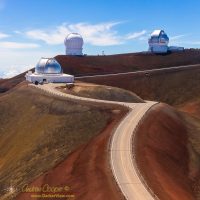Among the claims made against the observatories this is probably on the top three list… The observatories do not hire local people. As you can guess this is also quite wrong.

For those who do not work on the mountain it is easy to be skeptical of job claims. Too many think that you need to be an astronomer to work at an observatory, or need to have some advanced degree.
What so many folks do not realize is that observatories hire relatively few astronomers. Maintaining a large observatory is the job of a wide range of people, a few scientists and engineers, and a lot of skilled workers that get the job done.
Astronomers do not fix telescopes, guys who know what wrench to use fix telescopes. The summit crews are largely mechanics, technicians, welders, electricians, and similar. By and large these guys are local, with most having grown up in the islands.
Off the summit you will find the usual support staff needed by any organization… Accounting, payroll, front office, motor pool, maintenance, and the rest of the usual. Again, there are quite a few jobs that require no advanced education
You do not need a college degree to work at a telescope. What is helpful is a trade school certificate, industry certification, journeyman status, or a proven work record in a related line of work.
For those that understand the first part here there is another accusation… That the observatories do not pay those workers well, “exploiting low cost labor” has been seen a few times. This is also false and can be shown very easily.
The observatories need skilled workers, guys who really know how to get things done, these guys are in high demand across all island employers, there are only so many around. You want a truly skilled, motivated employee? You better be ready to pay him.
Skilled workers like electricians, mechanics, and welders can pocket a decent paycheck. A paycheck that one can raise a family on. The observatories pay the going rate on island or better, with full benefits included.
Another point to consider is that most of the people who depend on observatory jobs do not work at the observatories. While a given observatory may have a hundred direct employees, there are more than than in the community.
An economist will tell you that for every job at a factory of other industry that brings in outside money, there are three or four in the local community that depend on that industry. This applies to the observatories as well, as the money they spend does not come from Hawaii and is spent here.
Hundreds of jobs in Hilo and Waimea are a direct result of astronomy. Contractors, suppliers, truck drivers, elevator repairman, and more supply good and services to the observatories. Without observatory contracts and business those local businesses would be forced to cut payroll.
This outside money comes to somewhere around $100 million dollars for the local island economy. This goes to payroll, local businesses, and eventually the local tax base to benefit all island residents.
Part of this often repeated claim is that the observatories hire from off island. They do, only if they cannot find the needed skills locally. This means that some specialist positions have to be hired from other telescopes somewhere, or from industry.
A survey of the employees working for the observatories in 2017 found that a full third were born and raised on Hawaiʻi island. A good chunk more were born and raised in the state of Hawaii. Only 40% were hired from elsewhere, less than half. This rather puts to rest the myth that the observatories do not hire local.
Why hire local? Several very practical reasons… It is cheaper to hire local, there are no moving expenses and folks can usually start sooner. There is also a very real problem of people who move to the islands that do not adapt well to island life, quitting and moving away just after all the effort to hire and train them.
As a result the staff at most of the observatories is mostly local, made up of people who grew up in the islands and very much call Hawaii home.
A breakfast at Hale Pohaku with the summit crews drives home just how local. There is a lot of local conversation, where pig hunting is more likely to be table conversation than exoplanet formation.
It is local candidates that will be considered first. The Thirty Meter Telescope has promised this, and for obvious reasons will hold to that promise. They have already invested in local education to make sure those local workers will be available.
Looking for an observatory job? Check Mauna Kea Astronomy Jobs, there are a few positions open right now. Keep in mind that these jobs do not come open all that often, once in folks tend to stay a while at a good job.
Result: Mostly False


Amen . I was lucky enough to be hired by the Smithsonian Institution as a satellite tracker at their facility on Haleakala in the early 60s. No degree. Only 2 years at UH. To make a long story short, that e experience enabled me to get a job at Douglas Space Systems in California. Began on the bottom in the Apollo program and eventually became head of my own department when I retired. Born and raised in Paukukalo, Maui, Hawaii. Class of ’57 St. Anthony.